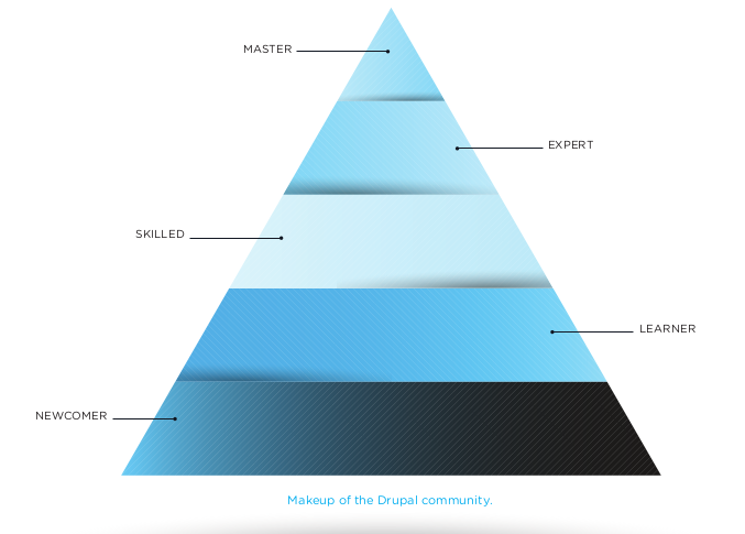 Drupal.org is one of the largest and oldest continuously-operating Drupal websites in the world. The amount of content we have is both a blessing and a curse. Historically developed and maintained by community volunteers, Drupal.org has been growing organically for over a decade. New content keeps being added, while no major changes to information architecture and navigation have made it easily findable. With about 1.2 million pieces of content, the need to overhaul Drupal.org has become obvious. But where do we even start?
Drupal.org is one of the largest and oldest continuously-operating Drupal websites in the world. The amount of content we have is both a blessing and a curse. Historically developed and maintained by community volunteers, Drupal.org has been growing organically for over a decade. New content keeps being added, while no major changes to information architecture and navigation have made it easily findable. With about 1.2 million pieces of content, the need to overhaul Drupal.org has become obvious. But where do we even start?
It is tempting to jump straight into content strategy, kick off a massive content audit, and talk about content types and archival processes. However, to develop comprehensive content strategy, you need to understand what kind of content is actually needed on your site. And to understand that, you need to know your audience.
Researching the Users
We underwent a user research project which lasted from May to August of 2014. Through a public request for proposal (RFP) process, we partnered with Whitney Hess, a user experience coach, to help guide the Drupal Association staff and community volunteers through the research.
The project kicked off with a full-day workshop at DrupalCon Austin. Participants included representatives from the Drupal Association staff and the Board of Directors, community volunteers, and advisors. Together, we brainstormed objectives for the new Drupal.org and metrics of success, as well as provisional user personas – our ideas about what those personas could be.
With that groundwork in place, we set out to validate (or disprove) our assumptions with real people.
We talked to 30 different users of our website located in the Americas and Europe: people who were new to Drupal, long-term community members, ex-Drupalistas, developers, site builders, designers, content strategists, PMs, and more. We sat down for an hour with each one of them and asked numerous questions about the way they use Drupal.org, things they enjoy about it, and their frustrations.
Once we had the data from the interviews, we started to synthesize it and develop personas.
Our first attempt was to follow the initial workshop idea of role-based personas: site builders, developers, designers, etc. As easy as that sounds, when we turned to real people, that approach simply didn’t work. People with similar job titles often had very different attitudes and motivations – even job responsibilities. And in turn, people with a lot in common as far as their use of Drupal.org often had completely different roles in their organizations.
Finding Our Personas
After a week or so of trying to map user interviews to role-based personas, we went back to the drawing board. We looked for patterns and common themes, and we built categories where we grouped people’s similar experiences and frustrations together. At the end of the process, we had come up with five distinct personas that can apply to everyone who visits Drupal.org. These personas are based on proficiency in Drupal and the Drupal ecosystem. They are:
- Newcomer
- Learner
- Skilled
- Expert
- Master
When we say “proficiency in Drupal and the Drupal ecosystem,” the second part is important. We are not only talking about knowledge of Drupal or ability to build a website with it. We are also talking about knowledge of the Drupal community – the whole ecosystem of contributed projects, Drupal shops, and service providers that surround Drupal – the knowledge of who the people are and where to find them; how to get an answer to your question; and so on.
People with all kinds of roles and backgrounds are present at every level of our “proficiency ladder”: developers, UX designers, project managers, business owners, themers, content strategists, and more. They can be experts in other areas, but when it comes to fluency in Drupal and the Drupal ecosystem, they could be represented as Newcomers, or Masters, or any persona in between.
Focus is Key
Our next step was to prioritize which of those personas we want to serve first. It is good to know who all of your various personas are, but development resources are always limited and, therefore, we knew we needed to set our priorities. We decided to select one or two primary personas, focusing on which will have the biggest impact on the overall user experience and will lead to stronger growth of the community and the Drupal project.
Ultimately, we want to move our users from Newcomers to Masters as quickly as possible. However, there are a few critical points on this path, which are currently very hard for our users to move through, and which are simultaneously highly important for our overall goals. The first point is conversion from Learner to Skilled. Growing our pool of Skilled users is crucial, because by doing so we grow the number of people who own and/or build websites using Drupal, and thus grow Drupal adoption.
The second critical point is the transition from Skilled to Expert. On the path from Skilled to Expert is where our users begin to give back by contributing patches, writing documentation, building and sharing modules and themes, helping others in the issue queues, and bringing in their friends. By growing the number of Skilled and Expert users on Drupal.org, we’ll directly grow our community.
What’s Next?
Now that we know who our personas are and for whom we want to improve experience first, we are ready to turn to content strategy. In the coming months, we will be looking at our current use of content types and drawing up a new content model of the site. We’ll be working on governance models around content to help ensure its high quality, and exploring changes to the site map and information architecture to support our users on their journey from Newcomers to Masters. At the end of the process, we will have revamped Drupal.org, making it much better suited to the needs of our audience.
Newcomer: This person has heard of Drupal, but has never built a Drupal site and doesn’t know where to start.
Learner: This person knows a bit about Drupal and the general Drupal ecosystem. He or she may have built a Drupal website, but likely has used only a few contrib modules and hasn’t made any customizations.
Skilled: This person understands and is fluent in Drupal-specific terminology, can build a Drupal website themselves using contributed modules, themes or distributions, or with the help of Drupal service providers. She or he has spent a decent amount of time working with Drupal, and is lightly engaged with the community – often not directly – via some sort of liaison.
Expert: This person has a deep understanding of Drupal and the Drupal ecosystem, and knows how advanced websites can be built with Drupal. Typically, an expert has been working with Drupal for at least a couple of years, is actively engaged with the community online and via local/national events, and contributes back in a variety of ways.
Master: This person has pervasive knowledge of Drupal and the Drupal ecosystem. He or she knows how to build Drupal websites of great complexity, is deeply engaged in the Drupal community, and knows and has access to other Masters. Usually, this person has been using Drupal and been around the Drupal community for a long time.
Resources:
More information on Drupal.org personas: http://wdog.it/5/1/persona
Author’s blog: http://wdog.it/5/1/tvn
